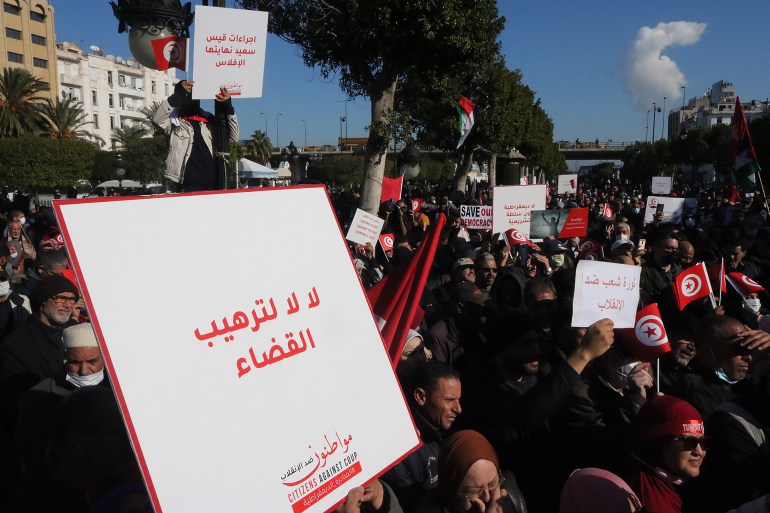The Presidency of the Tunisian Republic said that President Kais Saied issued a decree amending the Basic Law of the Supreme Judicial Council, amid a crisis that has been going on for weeks between the Tunisian Presidency and the Council.
A statement issued by the Tunisian presidency said that Saied signed a decree on Wednesday to put an end to the grants and privileges granted to members of the Supreme Judicial Council.
The decree implicitly represents a blow to the judiciary, which has been repeatedly criticized by President Saeed, and no official comment has been issued - so far - by the council, which had previously warned against the president's intentions to dissolve it.
Recently, a controversy prevailed in Tunisian human rights circles, regarding the "independence of the judiciary", in light of the president's statements in which he stressed that the judiciary is a "function of the state" and his allusion to the dissolution of the Supreme Judicial Council.
Said calls for the independence of the judiciary were considered interference in judicial affairs (Al-Jazeera)
independence of the judiciary
The debate on the independence of the judiciary has flared up since Justice Minister Laila Jaffal announced last October the preparation of a draft law related to the Supreme Judicial Council, which angered many judges.
The judges considered the Minister of Justice's statements an interference in the judicial affairs, while the President refuted that, stressing that the preparation of this project will be carried out with the participation of the judges themselves.
During his speeches in the last period, Saeed often emphasized that the judiciary is "the judiciary of the state" and that it is independent and that there is no authority over it except the law, and that "there is no way to purify the country except through a just judiciary, and judges above all suspicions."
The Supreme Judicial Council is a constitutional institution concerned with monitoring the proper functioning of the judiciary and the exploitation of judicial power. It enjoys administrative and financial independence and self-management.
The Council is responsible for organizing the judicial sector, supervising the transfer of judges, and expressing opinion on draft laws related to the administration of the judiciary.
National Consultation
In another context, the Secretary-General of the Tunisian Republican Party, Issam Chebbi, said that the national consultation is only a way to establish false legitimacy on the president's decisions.
In an interview with a local radio station, Chebbi stressed that dialogue between national and political forces is what the Tunisian people desire.
Chebbi indicated that his party considers the National Consultation "a new step in the policy of escaping forward. The consultation is to implement the political agenda of the President of the Republic, who wants to cancel all of the above."
Meanwhile, Tunisian Minister of Youth and Sports Kamal Daqish said that calls to boycott the electronic popular referendum "consider personal freedom", but he refused to question it.
In October 2021, the President announced that “People’s Consultations” would be launched in mid-January 2022, to end on next March 20 (the anniversary of Independence Day). Synthesis of different opinions and ideas, before June.
The death of a protester
Yesterday, Wednesday, political forces in Tunisia condemned the death of a protester who participated in the Revolution Day demonstration on January 14.
Al-Nahda announced in a statement, "Brother Reda Bouziane was martyred, as a result of his injury, after he was subjected to severe violence by security agents - while participating in the demonstration celebrating the Revolution Day on Friday -... which resulted in a severe brain hemorrhage."
The Ennahda movement denounced what it described as the heinous murder of one of its affiliates, and held President Kais Saied fully responsible for Bouziane's killing.
Ennahda demanded the dismissal of Interior Minister Tawfiq Sharaf El-Din, as he is directly responsible for "the violence that was imposed on peaceful demonstrators in several stations, and the kidnappings and forced detentions outside the law."
Earlier, the "Citizens Against the Coup" campaign mourned Bouziane, and said that he died of "injuries as a result of being assaulted and dragged" by the police.
Citizens Against the Coup called for holding a national funeral for Bouziane's funeral, stressing that it holds the "coup authority criminally responsible for this crime" and called for "the prosecution of the perpetrators before the Tunisian judiciary" and the International Criminal Court.
On the other hand, the Court of First Instance said that there were no visible traces of violence on the body of the deceased (Bouziane), according to the examination by the representative of the Public Prosecution, and indicated in a statement that an investigation had been opened into the incident, and the body was authorized to be presented to the Forensic Medicine Department.
lawyers pause
Lawyers organized a sit-down in front of the Palace of Justice in the capital, Tunis, to reject the exceptional measures taken by the president since last July.
Video clips showed lawyers gathering in front of the building, raising slogans denouncing what they described as the attacks on the demonstrators who came out on January 14, which coincides with the 11th anniversary of the fall of the Zine El Abidine Ben Ali regime.
Recent practices have brought Tunisians back to zero in terms of freedoms, after the country made great progress in it over the past years, lawyers said.
Al-Buhairi case
Meanwhile, the Defense Committee for Noureddine El-Beheiry (former Minister of Justice, Vice-President of the Ennahda Movement) said that its members were prevented from visiting their client in the hospital by a decision of the Minister of Interior.
Al-Buhairi, 63, is still on hunger strike to protest his arrest since December 31, which the Ennahda movement described as kidnapping.
Since last July 25, Tunisia has been witnessing a severe political crisis after Said took exceptional measures, most notably freezing the competencies of Parliament, lifting the immunity of its deputies, abolishing the constitutionality monitoring body, issuing legislation by presidential decrees, dismissing the prime minister and forming new ones.

